A Medical Imaging Application Specialist is someone who educates sonographers and providers of medical imaging about new technologies and equipment. These professionals are technically savvy and fill key roles working for major manufacturers and distributors of medical imaging equipment.
Job Description
Application specialists train customers and colleagues on how to use the medical imaging equipment they’ve acquired. They may also supervise or look after equipment installation, and they work with a variety of professionals, from sales to healthcare staff.
While responsibilities will vary by position and employer, some examples of responsibilities of an application specialist within the field of medical imaging might include:
- Provides technical or clinical assistance during marketing and sales processes.
- Trains and ensures that customers (including the “end-users” i.e. the medical imaging techs) are properly and optimally able to operate the medical imaging equipment they have purchased.
- Monitors the installation of medical imaging equipment.
- Provides on-going customer support and re-visits clients to receive feedback on the product(s) and their training needs.
- Keeps up-to-date on all equipment regulations and safety standards and communicates these to clients and colleagues.
- Develops instructional programs.
- Re-trains clients and colleagues when systems or technologies have been upgraded.
- Travels extensively.
- Customizes equipment to a client’s needs.
- Participates in trade shows and other demonstrations and presentations.
There are a variety of medical imaging applications specialist job descriptions, and naturally responsibilities and requirements vary by employer, the modality and other variables. Below is an excerpt from a job advertisement posted by the healthcare segment of a manufacturing company looking for an “ultrasound applications specialist”:
Responsibilities:
Technical and clinical leadership during sales process by demonstrating full range of Ultrasound products including potential uses, product capabilities and benefits to customers. Develop and deliver product training to customers on equipment use.
- Monitor customer installations of ultrasound products within assigned territory/region to improve customer satisfaction and maintain customer relationships.
- Support trade shows and professional conferences by performing product demonstration and customer training.
- Use market and product knowledge to assist sales team in developing sales, marketing and customer service strategies.
Requirements:
- High School Diploma and RDMS certification (Registered Diagnostic Medical Sonographer).
- Minimum of 2 years clinical experience following certification, with demonstrated skill in general imaging, obstetrics and gynecology (OB/GYN) including High Risk, and maternal-fetal medicine (MFM).
- Skilled in 2D, Doppler and color flow imaging.
- Willingness to travel up to 75% both within and outside your specified geographic region with overnight stays depending on geography and business need.
Related Job Titles
Medical imaging application specialists are sometimes referred to by other terms as well. These may include:
- Ultrasound applications specialist
- Clinical education specialist
- Radiology equipment specialist
- Clinical services specialist
- Clinical product specialist
- Product application specialist
- Medical imaging clinical application trainer
- Imaging equipment specialist
Career Paths
Note: some medical imaging equipment specialist careers may be more technical than others, such as requiring a greater knowledge of maintenance and repair. Instead of these professionals coming from a medical imaging background, they might come from a biomedical engineering, IT or electrical background.
The route to becoming an applications specialist within the medical imaging industry is not the same for each professional. Naturally it depends on the particular modality, the employer and the actual person advancing.
But generally speaking, for many of these types of positions, it starts with being an experienced user of that equipment. For example, before becoming an MRI clinical education specialist that person may have first worked for several years as an MRI technologist.
Some very general requirements to becoming a medical imaging applications specialist include:
- Clinical experience in that modality (i.e. as an ultrasound technologist, MRI tech, radiologic technologist, etc.)
- Completion of a relevant education program and necessary continuing education credits; a Bachelor’s degree may be preferred.
- Certifications (i.e. through the ARRT or ARDMS)
- Teaching or leadership experience will be highly preferred
- Clean driver’s record and a willingness to travel extensively
Remember every career path is different. The best way to learn how to pursue a particular career is to speak with potential employers (i.e. medical technology and equipment companies) as well as with professionals currently working in similar positions.
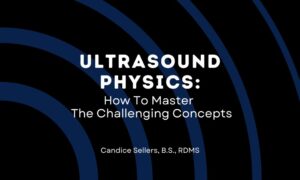
Candice Sellers, B.S., RDMS – Contributor Students attending ultrasound school consistently report that ultrasound physics is one of the most difficult courses in their program. It’s a required course and one that is important to master. Below you will find study tips and tools available to students to help them focus and hone in on…
How I Mastered Ultrasound Physics
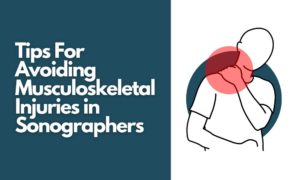
By Adrienne Hardy, RDMS (Ab, Ob/Gyn) – Contributor According to the SDMS, 90% of sonographers will sustain a work related musculoskeletal disorder; 20% will have a career ended because of the injury. With numbers this high it seems like it’s an inescapable truth that you must scan in pain or get injured at some point…
Most Common Injuries in Sonographers

By Adrienne Hardy, RDMS (Ab, Ob/Gyn) – Contributor As I sat in my entrance interview for sonography school the professors spattered me with questions: “Do you have enough savings? What is your home like? How do you manage your time? Do you have someone who cares about your success and will support you in hard…
Surviving and Thriving in Sonography School
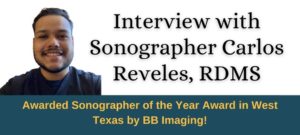
We recently had the pleasure of speaking with Carlos Reveles, a high risk Ob/Gyn sonographer. In this interview, Carlos shares with us what led to him being recently recognized as a standout sonographer by his employer, and what it’s like being a male in a traditionally female field. Welcome Carlos! Hello my Name is Carlos…
Explore Carlos’s Sonography Journey

Adrienne Hardy, RDMS (Ab, Ob/Gyn) – Contributor I clicked submit on the SPI physics exam and ran out the the room. The test proctor handed me a piece of paper with a huge scared looking picture of myself taken before the exam, my ARDMS number and the results of my SPI examination. My hand shook as…
Passing the Sonography Principles and Instrumentation Exam

Candice Sellers, B.S., RDMS – Contributor The Ultrasound School Experience Ultrasound school is a very exciting and rewarding experience. The excitement of finally reaching your goal of getting accepted into an accredited ultrasound program is certainly a tremendous milestone! However, there will be moments of frustration and stress that will occur during your journey in…
How I Managed Stress While in My Sonography Program
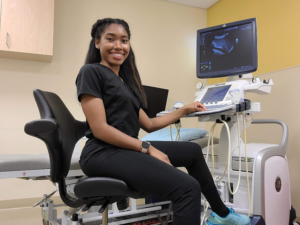
DruAusten Fields, RDMS (AB, OB/GYN), RVT – Contributor The Skilled Sonographer, DruAusten Fields, RDMS (AB, OB/GYN), RVT looks back on the development of her SPI test prep mini-course, and her work to help others pass their SPI exam. When I look back on where I started versus where I am, I can confidently say I have…
Tap into Dru’s Diagnostic Imaging Expertise
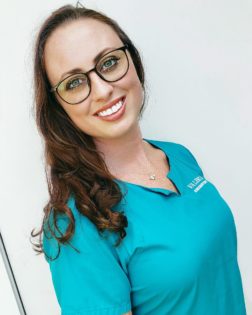
Adrienne Hardy, RDMS (Ab, Ob/Gyn) – Contributor What to expect as you transition from DMS student to the medical imaging workplace. Congratulations! You ran the marathon of Sonography school and now have gotten a job! What a relief, right? All the pent up anxiety and pressure of ultrasound school feels let off like a pressure valve…
Surviving the Transition: From Student to Sonographer Pro!
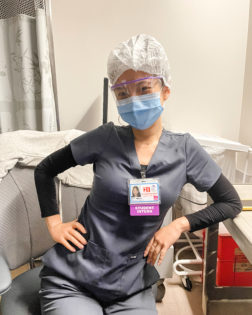
Lynn Nguyen – Sonography Student & Contributor Join Lynn on her journey as she pursues a 2nd career as a sonographer. Why Sonography? How Did I Get Here? I have never given sonography a thought much less loving the thought that I am going to be a sonographer one day. In high school I knew…
Why I Chose Diagnostic Medical Sonography

DruAusten Fields, RDMS (AB, OB/GYN), RVT – Contributor The Skilled Sonographer, DruAusten Fields, RDMS (AB, OB/GYN), RVT shares her sonography story! From Indecision to Decision Deciding on a lifelong career can be stressful, especially at a young age. During high school was when I began toying with the idea of pursuing a career in the…
Systems for Success in Sonography

Sam Callis, contributor at USI, is an author and sonographer with experience in multi-specialty clinical practice, higher education, and the medical device industry. She is the author of Diagnostic Medical Sonography – The Definitive Guide to Planning Your Career. We were first introduced to Samantha back in 2019 with this terrific interview in which she…
From Art to Science: A Sonographer’s Unique Career Path
The demand for healthcare professionals, including those specializing in medical imaging, continues to rise. As the aging baby boomer population grows, there is an increasing need for diagnostic imaging procedures, alongside a demand for new providers to fill positions vacated by retiring workers. This ongoing expansion in medical imaging careers presents excellent opportunities for individuals…
Updated for 2025












